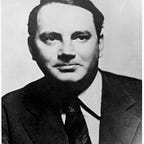Thomas Wolfe: Say That Again!
Where was Thomas Wolfe on the evening of December 1st, 1937? Accounts vary about the party he attended in New York City, the argument that ensued, and how a book title was born. Wolfe had been invited to a dinner party by author Sherwood Anderson at the apartment of a friend of Anderson in Manhattan. Wolfe later wrote, “…it was an ugly party…I don’t know where it came from.” At the party, there was a good deal of conversation about liberal and radical causes. This is not a surprise, as Anderson had publicly endorsed the Communist Party in the United States. And, during this period Wolfe found himself bombarded with pressure to endorse political causes, sign petitions, and serve on protest committees for various factions.
Anderson’s fourth wife, Eleanor Copenhaver, whom Anderson had married in 1933, provided an account of the party. She recalled stating at dinner that she had heard from someone in North Carolina that Wolfe's ancestors on the Pennsylvania side were part-Jewish. Wolfe “jumped up from the table” declaring he would take the next train to North Carolina and his mother would refute the slander. Wolfe was already aware of rumors that his paternal grandmother, Eleanor Jane Heikes, was Jewish. Years earlier Wolfe had attempted to trace his father’s genealogy and believed it to be untrue.
Among the dinner guests were Ella Winter and Max Eastman. Winter, widowed in 1936, had become “in demand” at private parties and public gatherings since her book Red Virtue: Human Relations in the New Russia appeared in 1933. Described later by screenwriter Donald Ogden Stewart as “a handsome middle-aged brunette who had the most extraordinary black eyes, alternately luminous and flashing as she spoke in a charming British voice.” She was born Leonore Wertheimer in 1898 in Australia. Upon moving to England, about 1910, her family changed their name to Winter to avoid antisemitism.
Winter later married muckraking journalist Lincoln Steffens. They moved to the U.S. from Paris, where they had come to know Ernest Hemingway. Settling in California, Winter became a naturalized American citizen in 1929. Traveling several times to the Soviet Union to gather research for her writings, she had come to believe the Soviets were designing mankind’s utopian future. She became a member of the Communist Party and was well-known as a journalist and active supporter of leftist causes. In her autobiography, Ella Winter remembered “one night at Sherwood Anderson’s I met a towering, broad-shouldered man, who nevertheless seemed childish, Thomas Wolfe. An argument developed about anti-Semitism with Max Eastman. Eastman accusing Wolfe of it and Wolfe replying in violent self-defense.”
Winter continued “That evening was the beginning of a singular, ships-that-pass-in-the-night relationship. Wolfe took me out almost every night to dinner and talked compulsively…he complained of his family and the bad time he had had when he went back to North Carolina. Reminded of my own troubles with my mother, I laughed and said, “Don’t you know you can’t go home again?” Wolfe stopped dead, “Say that again!” he commanded. I did, surprised. Then, in great excitement, he asked. “Can I have that? For the title of an article?” “I don’t own it” I laughed. “I merely made a remark based on my own experience.”
Max Eastman had long been known as a popular member of the bohemian left in New York City, an editor, writer, literary critic, and popular lecturer. Wolfe was aware of his reputation and just months earlier, while in Asheville, had received a clipping from an August 14th story in the New York Times with the headline “Hemingway Slaps Eastman in the Face.” The famous fight happened one afternoon in the office of editor Max Perkins at Scribner’s. Eastman had authored an essay titled “Bull in the Afternoon” containing taunting lines about Hemingway. Discovering Eastman in Perkin’s office, Hemingway hit him in the face with an open book found on Perkin’s desk and said to have contained the essay.
Perhaps Wolfe also wanted to slap Eastman at Anderson’s party. It took much effort to calm him down. Weeks later, still on the defensive, Wolfe wrote Anderson “…apparently a lot of people have thought I was a pretty American sort of writer, and what I did was indigenous to this country. I hope this is true. At any rate, I am pretty proud of it, and I would like to live up to it, and I say this honestly without a word or thought of prejudice toward any people, any race, or any creed.” That December evening Ella Winter’s question had made a great impression on Wolfe. Thomas Wolfe believed he would yet discover his home in the future.
For more information:
Ella Winter, And Not to Yield (1963); Thomas Wolfe to Sherwood Anderson 20 Dec 1937; Thomas Wolfe to Edward Aswell 14 Feb 1938; and David Herbert Donald, Look Homeward: A Life of Thomas Wolfe (1987).
